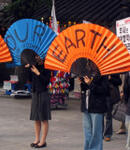

Researchers

This project seeks to understand the emergence and evolution of social movements during the 1970s and 1980s in South Korea. During the authoritarian years when Korea was ruled by (former) military generals, various social groups participated in the movement to restore democracy and ensure human rights. Their activism was instrumental to democratic changes that took place in the summer of 1987 and they continued to play an important role even after democratic transition. The Stanford University Korea Democracy Project is an effort to understand the dynamics of this social movement from 1970 to 1993.
Based on sourcebooks obtained from the Korea Democracy Foundation (minju hwa undong kinyom saophoe), we created novel quantitative data sets. Specifically, we have coded main features of nearly 5,000 protest and repression events from 1970 to 1993, using a comprehensive coding scheme that we developed. In addition, we coded an organizational directory that includes characteristics associated with 387 social movement organizations that were active during this same period. While there are many informative studies of particular moments in Korea's democracy movement (e.g. the Kwangju uprising), the Korea Democracy Project aims to provide a systematic overview of the movement as it developed through the most authoritarian period (1972-1984), democratic transition (1987), and the democratic period (post 1987). Data access is currently limited to project researchers. We estimate the data will be released for public use in 2024-2025.
In October 2008, a major conference, "From Democracy to Civil Society: The Evolution of Korean Social Movements," was convened to explore the role of social movements in South Korea both before and after the democratic transition of 1987. The conference resulted in an edited volume, South Korean Social Movements: From Democracy to Civil Society (2011).
Co-hosted by The Center on Democracy, Development and the Rule of Law (CDDRL) of FSI, a conference on "New Challenges for Maturing Democracies in Taiwan and Korea" was convened in May 2011. The conference compared the character, status, and evolution of democracy in Taiwan and South Korea. The findings of this conference were published as an edited volume in January 2014.
This project will produce a series of books on democracy in Korea.
Publications
Multimedia
Events
Democracy in Korea: The Politics of Extreme Uncertainty
12:00 PM - 1:15 PM (Pacific)
New Challenges for Maturing Democracies in Taiwan and Korea
8:00 AM - 4:30 PM (Pacific)
Democratic Politics and Labor Activism in Korea
12:00 PM - 1:15 PM (Pacific)
The Weakness of Liberalism and Its Political Consequences in Democratized Korea
12:00 PM - 1:15 PM (Pacific)
From Democracy to Civil Society: The Evolution of Korean Social Movements
12:00 AM - 12:00 AM (Pacific)
